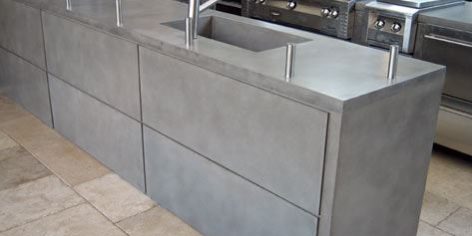Are you familiar with the latest trend in home design? Once reserved for pouring foundations and building sidewalks, concrete is coming into its own as a decorative building material in a big way. These days, it’s becoming one of the most popular, trendy choices in counter top materials. Before you remodel your home or choose concrete for your new construction project, though, it’s a good idea to learn a bit more about how concrete lends itself to life as a counter top material.
Pros and Cons of Concrete Counter Tops
How well does concrete stack up against the competition when it comes to counter tops? You may be surprised to learn just how durable and versatile concrete can be as a counter material. Pigments can be mixed into the concrete early in the process, or the material can be etched, stained and painted for a truly one-of-a-kind, customized product. No matter what look you’re going for, there’s a way to make concrete adapt beautifully.
When they’re properly poured and installed, concrete counter tops can last as long as your house. You’ll almost certainly face replacement only if your tastes or style changes in the future, because a well-built concrete counter top will not fail. It may develop hairline cracks during the curing process, but a skilled builder can avoid even those.
Unfortunately, there are some drawbacks to choosing concrete for your kitchen work surfaces. The natural porosity of concrete can make it very susceptible to staining, so you’ll need to make sure you’re using a food-grade sealant regularly to protect the surface. Failure to use a cutting board can also lead to minor scratches in the surface of the sealer. These scratches are easy to repair, for the most part, and don’t affect the integrity of the counter tops.
Getting the Most for Your Money with Concrete Counter Tops
Whether you’re planning a full construction project to build your dream home or a renovation designed to make your existing house fit that bill, you want to make sure you’re getting the most for your investment. Building projects of any kind can come with some risk of fault or error, from poor workmanship to low quality in building materials and choices. Your builder has a vested interest in disguising these flaws, which means you need a neutral third party to protect your property.
Working with a professional building inspector is the single best way to ensure you’re not going to be left on the hook for hidden faults, defects and flaws. Investing in a stage construction inspection or a pre-purchase property inspection means you’ll never have to be surprised by potentially costly and dangerous issues.
Before you finish up your building or renovation project that includes the addition of concrete counter tops, call a professional building inspection company. Give yourself, your family and your bank account some peace of mind, knowing your new space has been built according to all relevant regulations, including the Australian Standards.
Houspect Building Inspections– Buy, Build, Invest and Sell with Confidence







